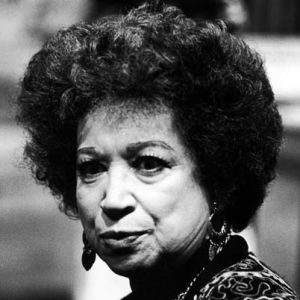
Photo: Playwright Alice Childress.
Next week we finish with plays from the Black Arts Movement and move to poetry.
For Monday, October 26, Read Alice Childress’s play Wine in the Wilderness in the SOS reader. Bring the book with you to class so you can refer to specific lines. We’ll also finish discussion of Sonia Sanchez’s The Bronx is Next: please re-read that. (PDF of the Sanchez play is on the readings page). One recurring theme we see in these plays is that of urban rebellions/riots.
Think about the following as you read:
- What’s the setting of the play and how does it help shape the action?
- What themes of Black Arts and Black Power do you see? Mark/underline specific examples in the text.
- What characters are portrayed in the play and how are they shown?
- What social commentary or critique does Childress make?
-
Watch the short trailer for the Newark ’67 documentary for background. You can watch the entire film online using your Hunter NET ID.
Optional: The documentary film I’ve been showing clips of in class, <em>Black Theater: The making of a Movement, is also available to stream with your Hunter NET ID if you want to explore further.
Announcements: The Sun Ra Arkestra (directed by Marshall Allen) will be at Brooklyn Bowl in Williamsburg on the 22nd. The Arkestra was founded by the eclectic musical visionary Sun Ra and has been kept going since his death by Marshall Allen. Also, a new Nina Simone documentary, The Amazing Nina Simone is playing for a week at the AMC Empire 25 theater on W 42nd St. Worth catching if you have an interest in Simone, especially for this class.
Photo: The Last Poets, circa 1970.
For Wednesday, October 28, watch the following videos in the embedded YouTube playlist. All are from albums of recorded 1960s/70s poetry.
Presentation by Sheniece, Alycia, Papo, and Yudhel.
Think about the following as you watch:
- What kind of audiences might these appeal to? Why?
- What themes of Black Arts and Black Power do you see?
- How might these appeal to people not traditionally into poetry?
- Would you buy these records
- Optional: See Pat Thomas’s book Listen Whitey: the Sights and Sounds of Black Power 1965-1975, on reserve in the Hunter Library for more on music and spoken word.



